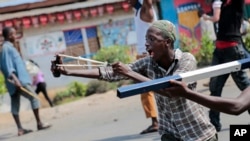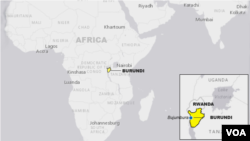Conditions in Burundi continue to deteriorate as violent demonstrations lead to more deaths, injuries and displacement, United Nations aid agencies say, warning the political crisis could become a humanitarian one.
An estimated 20 people reportedly have been killed since protests erupted in late April following President Pierre Nkurunziza’s decision to seek a third term, a move opponents say is unconstitutional.
Agathon Rwasa, Burundi's leading opposition leader, Friday said his party would boycott national elections, The Associated Press reported.
The insecurity has sent tens of thousands of people fleeing to countries neighboring the Central African nation.
While most of the dead are adults, the U.N. Children’s Fund said youngsters also have been caught up in the turmoil.
"Five children have been killed" in shootings and "200 injured since the start of street protests in and around Bujumbura," the capital city, UNICEF spokesman Christof Boulierac said.
He said the ongoing crisis threatens children, especially those who participate in demonstrations that turn violent.
Reports of arrested children
UNICEF is concerned by reports of children being arbitrarily arrested and unlawfully detained in prisons in Bujumbura. Boulierac said his agency is working with the U.N. refugee agency to identity the children, secure their release and reunite them with their families.
The growing violence is making access to health centers and hospitals more difficult, Boulierac said. It also has prompted school closures in many parts of the city.
He said UNICEF is worried the government’s newly announced budget cuts, which affect health and education, would make children even more vulnerable.
"Burundi is one of the poorest countries in the world, with one of the highest child malnutrition rates," Boulierac said. "… Prolonged insecurity that provokes repetitive displacement of people is likely to have a massive impact on an already vulnerable population."
The country has topped the Global Hunger Index for three years in a row, in an accounting compiled by several organizations, including the International Food Policy Research Institute. It’s released each fall just before World Food Day.
The World Food Program and other U.N. agencies have begun three missions to assess the ongoing crisis’ impact on food security in the country’s most affected areas.
WFP has been providing food and nutritional supplements to more than 1 million people since January. WFP said it expects this pre-crisis humanitarian operation will be expanded once the findings from the assessment missions are known.
Some information for this report was provided by The Associated Press.





